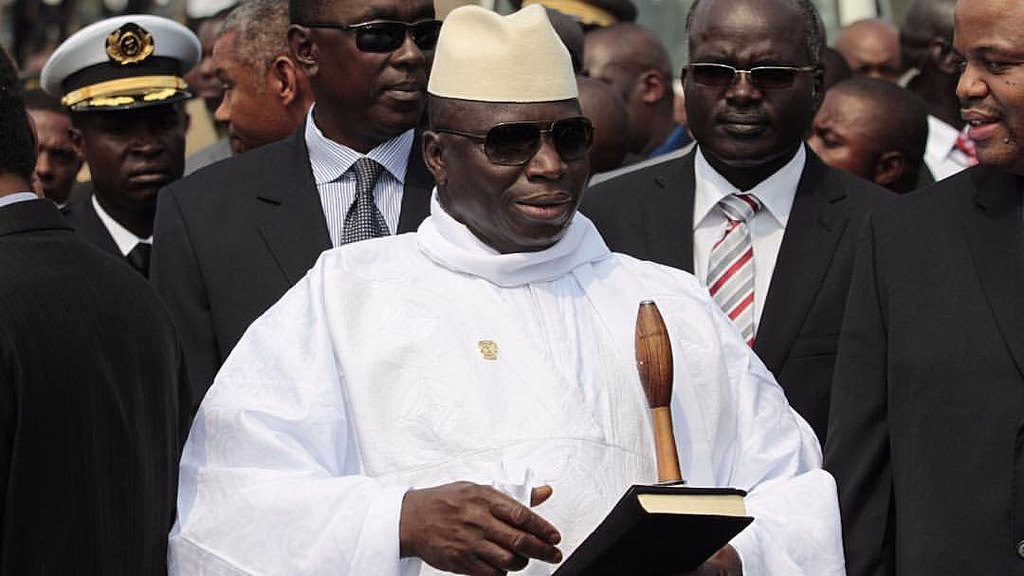Top EU Diplomat Expelled on Orders from Gambia President Jammeh
/BANJUL, Gambia - After being expelled under orders that left Brussels “astonished,” the European Union (EU) representative to Gambia left the country within the 72-hour deadline by boarding a Brussels Airlines flight back to the EU headquarters.
Agnès Guillaud, the European Union's chargée d’affaires in Banjul, received her expulsion orders on Friday, 5 June 2015 and was asked to leave Gambia within a strict 72-hour deadline.
The Gambia’s president, Yahyah Jammeh, expelled the European Union’s top diplomat to his country without "much explanation" an EU spokeswoman said. In response, the EU summoned the Gambian ambassador on Saturday for clarification of the expulsion.
A clear explanation has yet to be released publicly, but what is certain is that the expulsion comes at a time of tension between the EU and the Gambia on issues of international human rights.
Last December the EU blocked over $12 million in aid to the Gambia, citing its “poor human rights record” as justification for the withdrawal. With the expulsion Guillaud, on top of the recent report released by the U.N. Office of the High Commissioner for Human Rights (OHCHR) stating that LGBT people must receive civil rights protections equal to those of any other citizen, to the suppression of free speech, and the unjustified execution of prisoners; Jammeh's government has become for all intents and purposes a dictatorship.
EU officials found the expulsion completely unjustified. "There appears to be no justification for the decision by the Gambian authorities. We are astonished by this announcement which came with no explanations," an EU spokeswoman said.
This expulsion comes in a wave of many anti-western political moves led by Jammeh who in 2013 withdrew his country from the British Commonwealth, with officials saying that the institution represented nothing more than “prolonged colonialism.”
The President has also received international criticism for his claim that he has a herbal remedy that can cure AIDS and his 2012 statements in which he vowed to execute dozens of prisoners in his jails during an “anti-crime” crackdown. In addition to President Jammeh's human rights abuses in terms of due process, he has openly expressed anti-homosexuality rhetoric which is an increasing phenomenon amongst many African leaders.
On 16 May 2015, the White House released a statement by U.S. National Security Advisor Susan Rice, in which she stated that the U.S. stands in solidarity the LGBT community and specifically accused President Jammeh of "unconscionable comments.....which underscore why we must continue to seek a world in which no one lives in fear of violence or persecution because of who they are or whom they love. We condemn his comments, and note these threats come amid an alarming deterioration of the broader human rights situation in The Gambia. We are deeply concerned about credible reports of torture, suspicious disappearances – including of two American citizens - and arbitrary detention at the government's hands." (Source: The White House)
In response to these accusations, Jammeh's office issued the following statement, “The National Security Advisor should instead address racism, abuses and impunity in America where lately innocent and unarmed African-Americans, for example, are being regularly shot by white police officers with impunity rather than prescribe human rights to Gambians who have a long history of civilization.”
There is no proof that the expulsion had anything to do with Jammeh's hard-line positions dedicated to his so called "preservation of social norms", or the fact that Gambia has increasingly come under fire because of its gross human rights abuses, but it remains to be seen if the government will retract the order for the expulsion of Guillaud, or continue to forge a path that will further encourage sanctions and a decrease in international aid.
Contributing Editor: @AustinBryan
LinkedIn: Austin Drake Bryan













